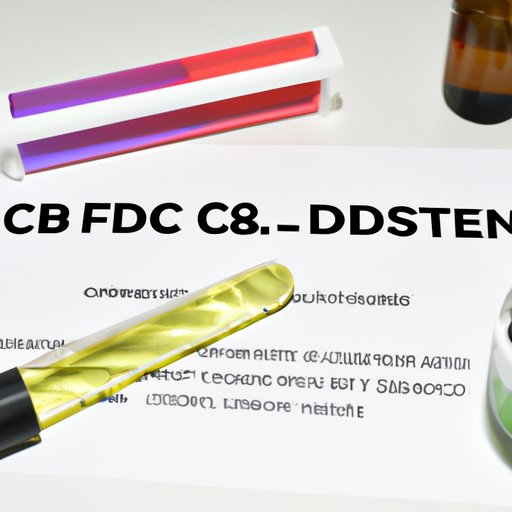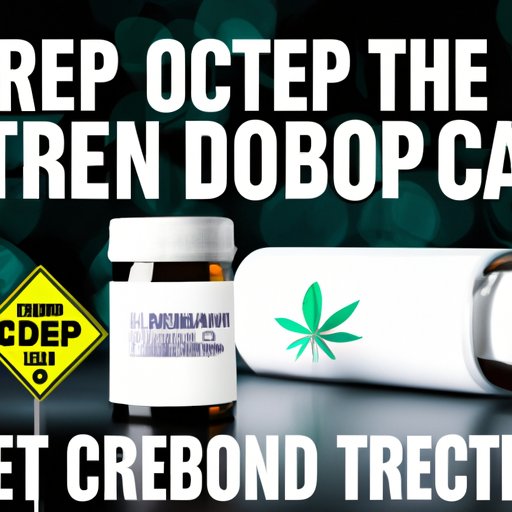Introduction
As more and more people turn to CBD for its potential health benefits, truck drivers with commercial driver’s licenses (CDL) have raised concerns about the risk of failing drug tests due to CBD use. This article aims to shed light on the topic of CBD and CDL drug testing, providing truck drivers with the information they need to make informed decisions about their health and livelihood.

The Truth About CBD and CDL Drug Tests: What You Need to Know
Cannabidiol (CBD) is a natural compound found in the cannabis plant. Unlike tetrahydrocannabinol (THC), another cannabis compound, CBD does not produce the “high” typically associated with cannabis use. Therefore, CBD is legal in most states, as long as it is derived from hemp plants with less than 0.3% THC.
While CBD is legal, CDL drivers must be cautious when using CBD products, as some may contain trace amounts of THC. These amounts may be high enough to show up on drug tests, putting the driver’s CDL at risk.
Navigating Drug Testing Guidelines for CDL Drivers Who Use CBD Products
CDL drivers may be subject to different types of drug tests, including urine, hair, saliva, and blood tests. The typical drug test for CDL drivers involves a urine sample analysis for several substances, including THC. The Federal Motor Carrier Safety Administration (FMCSA) sets guidelines for drug testing in the commercial trucking industry, including what substances are tested for and how often drivers are tested.
To avoid testing positive for THC, CDL drivers who use CBD products must ensure that the products they use are free of THC. While the FDA does not regulate CBD products, drivers can look for products that have undergone third-party lab testing and have a certificate of analysis (COA) to confirm their THC content. Additionally, drivers should avoid using full-spectrum CBD products, as they may contain trace amounts of THC.

CBD and CDL Drug Tests: Separating Fact from Fiction
One common misconception about CBD and drug testing is that CBD oil is the same as marijuana and, therefore, will cause a positive drug test. In reality, pure CBD oil should not cause a positive test result. However, some CBD products contain THC, which can cause a positive result, making it essential for CDL drivers to choose THC-free products.
Another myth surrounding CBD is that it can be metabolized into THC in the body. While some studies suggest that high doses of CBD may lead to a positive result on a drug test, this is unlikely to occur with the typical doses used in CBD products.

Protect Your CDL: Understanding the Risks of CBD and Drug Testing
The potential risks of CBD use for CDL drivers include not only failing a drug test but also losing their CDL and the consequences that come with it. Drivers who test positive for THC may be required to complete a substance abuse program and may be ineligible for a CDL for a specified period. Repeat offenders may face more severe penalties, including lifetime disqualification from holding a CDL.
CBD and CDL Drivers: How to Stay Compliant with Drug Testing Standards
To stay compliant with drug testing standards, CDL drivers who use CBD products should only use THC-free products, such as CBD isolate or broad-spectrum CBD oil. Additionally, drivers should avoid using CBD products for several days before their drug test, as THC can accumulate in the body over time.
If a driver is concerned about failing a drug test but still wants to use CBD products, there are alternative options available, such as using CBD topicals or edibles that do not enter the bloodstream or choosing non-THC alternatives, such as CBN or CBG.
Conclusion
For CDL drivers who use CBD products, it is essential to understand the risks associated with drug testing. By choosing THC-free products, understanding testing guidelines, and taking precautions before drug tests, CDL drivers can ensure compliance with federal drug testing standards and protect their livelihood. Remember always to seek legal counsel from a qualified attorney if you have any questions or concerns about your specific situation.
